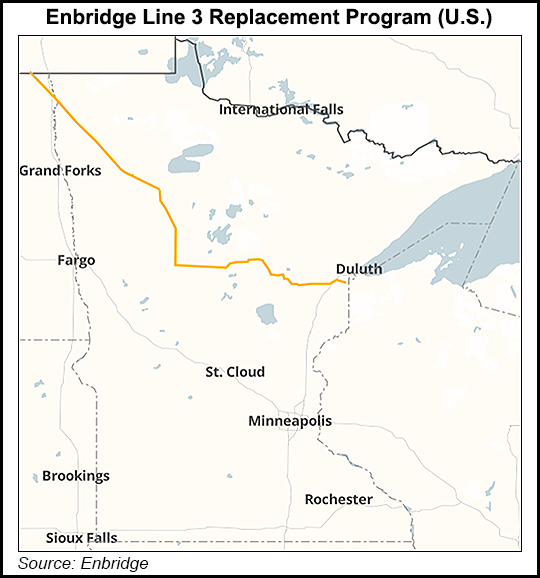Regulatory | NGI All News Access
Minnesota Governor to Continue Appeal of Enbridge Line 3 Replacement
Minnesota Democratic Gov. Tim Walz said he plans to continue an appeal filed during the final days of the former administration over Enbridge Inc.’s plans to replace an oil pipeline across the state’s northern tier.

Walz said the state Commerce Department would petition the Minnesota Public Utilities Commission (MPUC) to reconsider its decision last September to issue a certificate of need for the Line 3 replacement project. Calgary-based Enbridge has proposed replacing the pipeline, which was built in the 1960s to carry Canadian crude from Alberta through North Dakota and Minnesota to its terminal in Superior, WI.
The replacement would allow a 370,000 b/d gain in export capacity from the Alberta oilsands. The replacement pipeline would restore deliveries to the original level of 760,000 b/d, after running at about half-capacity since 2010 because of safety restrictions.
“When it comes to projects that impact our environment and our economy, they must follow the process, the law, and the science,” Walz said. “Projects like these don’t just need a building permit to go forward, they also need a social permit. Over the past month, my administration has met with groups on all sides of this issue and Minnesotans deserve clarity in the law.”
The Commerce Department asked the Minnesota Court of Appeals to review the decision last December, when Gov. Mark Dayton was still in office. However, last week the court determined that an appellate review was premature. In a related matter, the court scheduled oral arguments on March 20 for a review of the commerce department’s environmental impact statement, which the commission had initially determined was inadequate.
The court’s moves prompted Walz, who took office on Jan. 7, to take action, according to reports.
MPUC issued an order granting a certificate of need for Line 3 last September, but the order was contingent upon Enbridge’s compliance with certain conditions. The commission approved the compliance filings last month. According to MPUC Executive Secretary Dan Wolf, petitions for reconsideration of the January order were due Tuesday (Feb. 12), and answers to the petitions are due next Friday (Feb. 22).
Wolf said MPUC would review petitions concerning the January order by early April. If any petitions are denied, appeals may be filed with the Minnesota Court of Appeals.
Enbridge spokeswoman Juli Kellner called the Walz’s decision “unfortunate.”
“The commission’s approval came at the end of a thorough review of the facts, spanning four years, thousands of hours of environmental and cultural study, and substantial public comments,” Kellner told NGI’s Shale Daily. “Our focus is on actively working with the Walz administration and agencies to develop a clear sense of the schedule for the permits necessary to begin construction of the Line 3 replacement project.”
Kellner said the announcement by Walz would not impact Line 3 construction as Enbridge is continuing to work toward having the pipeline enter service by the end of the year.
A pro-pipeline group, Minnesotans for Line 3, said it was “incredibly disappointed” by the governor’s decision but also expressed optimism that the project would ultimately move forward. “The only thing this needless appeal does is to create ambiguity in what has been a clear and robust regulatory process,” the group said. “Today’s decision by this governor to have one part of state government continue to legally challenge a decision by another agency unfortunately shows us all that the reality of this administration’s leadership falls far short of what was promised.”
Minnesota House Minority Leader Kurt Daudt, a Republican, accused Walz of “throwing up unnecessary roadblocks” in an attempt to block Line 3. “The governor is choosing today to stand on the side of extreme environmentalists who occupy his office, shut down meetings and commit felonies because they refuse to accept that pipelines are the safest way to transport oil.”
Conversely, environmental groups supported Walz. “This is an important step in stopping Line 3 and in creating a new status quo where new fossil fuel infrastructure projects are regarded with the skepticism they deserve,” said Environment Minnesota State Director Tim Schaefer.
© 2024 Natural Gas Intelligence. All rights reserved.
ISSN © 2577-9877 | ISSN © 2158-8023 |
